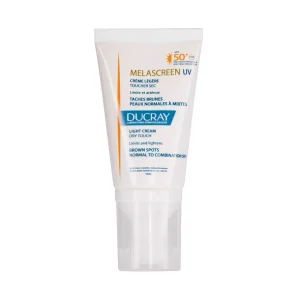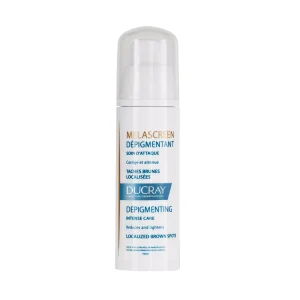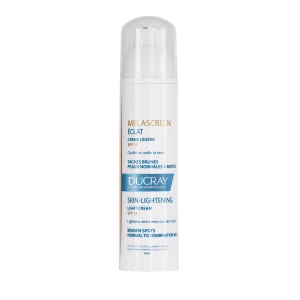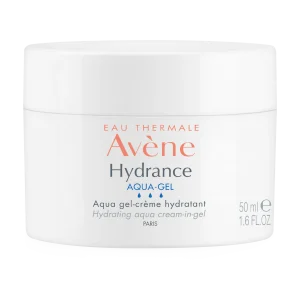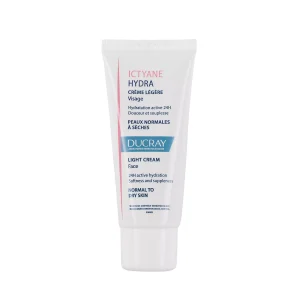
After a summer in the sun, you may be wondering how to get rid of dark spots on your skin due to sun damage. Following months of UV exposure, discolorations in the form of freckles, dark spots, or scars may suddenly be visible, leading to the question of how to get rid of dark spots. Instead of just covering them up with a concealer, invest in a pigmentation removal cream that can help fade hyperpigmentation for good.
In this article from The Dermo Lab, we’re going to look at dark spots resulting from hyperpigmentation. We will also discuss, in collaboration with the dermatologist and cosmetologist Dr. Rania Lotfy, their causes, how to get rid of them, and some treatment options, in addition to habits and ingredients that people should avoid.
What is meant by pigmentation?
According to Dr. Rania Lotfy, hyperpigmentation is an increase in melanin cells in the dermis and epidermis.
Most people have dark spots on the face, but dark spots can also affect the skin of the body. Usually, they are caused by damaged skin, and in most of the cases they aren’t dangerous. Also known as brown spots, dark spots on the skin can vary in color from light to dark brown.
What are the main causes of dark spots?
Knowing the main causes of brown spots can help you better understand how to avoid them in the first place. Brown spots on the skin can be caused by several different reasons:
1- Sun Damage – One of the main reasons for dark spots is excessive sun exposure. This is why brown spots on the face are common, as well as in other sun-exposed areas. Brown spots on the face are found in about 90% of people over the age of 60, but they can also be found in young adults, especially those who frequently use sunbeds. Sun damage causes the skin to produce more melanin to protect itself from harmful UV rays. As a result, brown spots begin to appear on the face and other parts of the body.
2- Melasma – Melasma is much more common in women, as it can be caused by hormonal imbalances due to pregnancy, menopause, or when using birth control. It affects areas of the body that are often exposed to the sun, causing brown spots on the face, neck, and hands. There is no need to worry, melasma is harmless and does not raise any medical concerns.
3- Post-inflammatory hyperpigmentation – This is caused when the skin has suffered some form of trauma, such as acne scars, burns, or psoriasis, leaving behind brown spots. It is particularly common with age, as skin cells do not reproduce as quickly.
How to get rid of dark spots on the skin?
First of all, we always recommend that you consult your dermatologist if you are concerned about any changes in your skin. That being said, there are a few ways to improve the appearance of dark spots on the skin and even prevent them from occurring in the future. Dr. Rania Lotfy highlights 4 ways: Sunscreen, whitening cream, moisturizer, and peeling.
1- Sun protection
If you think your brown spots are due to sun damage, invest in a good sunscreen with a high SPF to protect your skin from further damage. Sun damage leads to an overproduction of melanin, which in turn causes brown spots on the skin. By using a sunscreen for pigmentation with a high SPF, you do not only protect yourself from brown spots on your skin, but also from a wide range of other problems associated with overexposure to the sun.
Try the following sunscreen for optimal protection against UV rays and correction of existing dark spots.
Ducray Melascreen UV Light Cream SPF50+
2- Pigmentation removal cream
Look for skin lightening creams to improve the appearance of dark spots. The most common ingredient is hydroquinone, which inhibits a melanin-producing enzyme. Dr. Rania Lotfy indicates that you should also look for products containing ingredients such as kojic acid, glycolic acid, and tranexamic acid.
We’ve rounded up the best pigmentation removal creams to rejuvenate your skin for a clearer complexion and a fresher face.
Ducray Melascreen Depigmenting Intensive Care
Ducray Melascreen Eclat Light Cream SPF15
3- Moisturizer
Keep your skin moist to stimulate cell renewal. A good product containing moisturizing agents such as glycerin or hyaluronic acid will improve your skin’s overall radiance. These ingredients allow the active depigmenting agents to work more effectively. A good moisturizer also helps restore the skin’s lipid barrier and protect it from the sun’s harmful rays.
That’s why we recommend the following products from two premium brands:
Eau Thermale Avene Hydrance Aqua-Gel
Ducray Ictyane Hydra Light Cream
4- Peeling
Chemical peels, including trichloroacetic acid (TCA) or glycolic acid, superficially injure the skin to cause a healing reaction that expels dark pigments.
Professional chemical peels are more powerful versions of over-the-counter acid peels. Stronger peels work on deeper layers of the skin, but their recovery time is also longer.
How to prevent dark spots on your skin?
It is important to note that not all causes of brown spots on the skin can be prevented – some occur naturally due to age and other factors. The good thing is that brown spots caused by sun damage can definitely be prevented!
- Use sunscreen
Using sunscreen protects your skin from the sun damage that causes brown spots.
- Cover up
Brown spots on the face, neck, and other overexposed areas can be prevented by covering them from the sun. Even if you use sunscreen, these areas are still more prone to dark spots than others. Try a baseball cap or wide-brimmed hat to protect your face and neck from the sun.
- Avoid the midday sun
The sun is at its hottest and most intense between 12 pm and 2 pm. During these hours, you are much more likely to suffer sun damage that can lead to brown spots on your skin. To avoid this, find shade during this part of the day and enjoy the sun at times when it is not as harmful to your skin.
FAQ about pigmentation removal cream
Is vitamin C good for pigmentation?
Dr. Rania Lotfy confirms that vitamin C is beneficial for skin pigmentation.
Vitamin C is a powerful antioxidant, which gives it the ability to protect your skin from free radicals caused by UV rays. Make sure you get enough vitamin C in your diet, from sources such as strawberries and oranges, to protect you from dark spots.
Is vitamin E good for pigmentation?
Vitamin E is also an antioxidant, which means it has many benefits for the skin. One of the main benefits of vitamin E is its ability to reduce UV damage to the skin, which can otherwise cause brown marks on the face.
How do glycolic and azelaic acids in depigmenting creams help fight pigmentation?
Dr. Rania Lotfy notes that both acids help treat pigmentation by exfoliating the skin.
Azelaic acid exfoliates the skin, unclogs pores, reduces inflammation, and even lightens pigmentation. Glycolic acid also exfoliates the skin and removes darker dead skin cells from the skin’s surface, revealing a fresh layer of skin with a more even tone.
Can any of the lightening ingredients in a pigmentation removal cream be harmful?
Some skin-lightening products may contain steroids, which people should not use without medical supervision. Others may even contain mercury, which is highly toxic.
Last Updated on March 14, 2024

